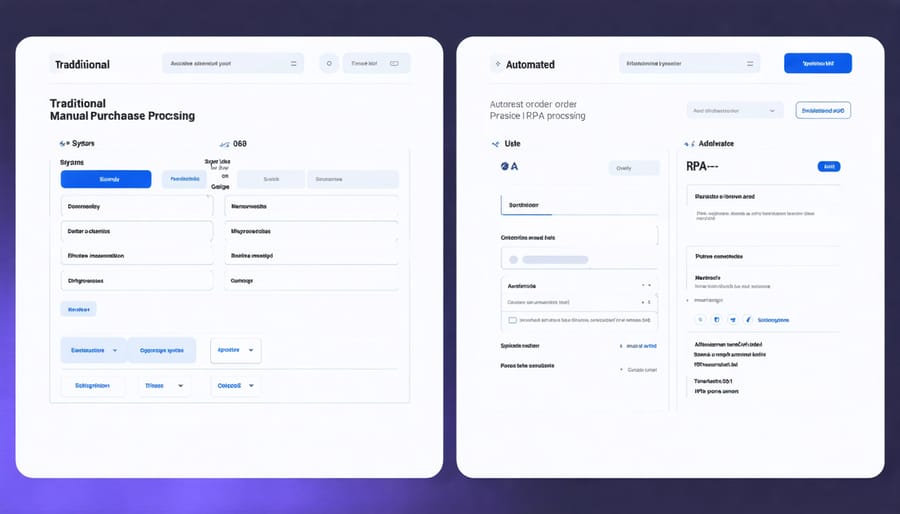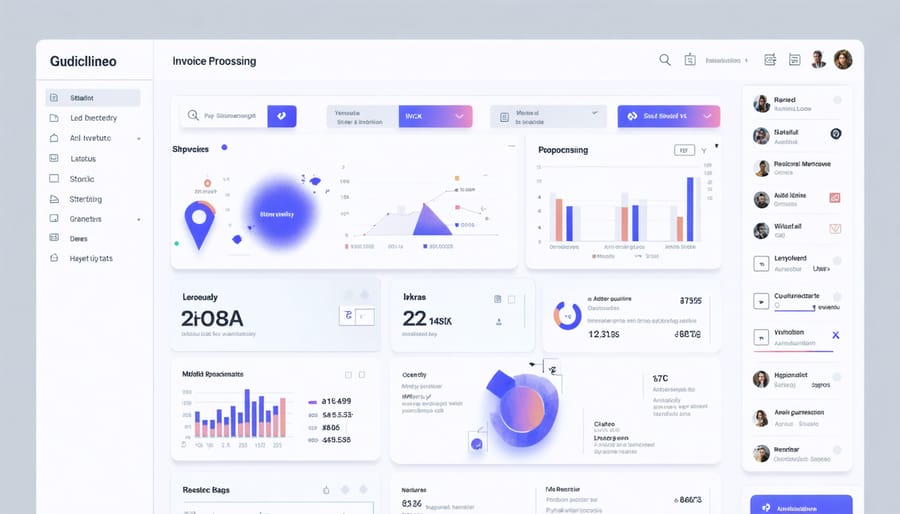Robotic Process Automation (RPA) revolutionizes construction procurement by automating repetitive tasks and delivering up to 70% cost reduction in administrative processes. Leading construction firms leverage RPA bots to streamline purchase order creation, automate vendor qualification workflows, and execute real-time compliance checks across their supply chains. Through digital procurement transformation, companies like Turner Construction and Skanska have automated 85% of their routine procurement tasks, reducing processing times from days to minutes while eliminating human error.
Industry leaders deploy RPA solutions across three critical procurement functions: automated bid analysis and comparison, intelligent document processing for contracts and invoices, and dynamic supplier relationship management. These implementations consistently deliver 40-60% efficiency gains while enabling procurement teams to focus on strategic decision-making rather than manual data entry.
The measurable impact of RPA in construction procurement extends beyond cost savings, with documented improvements in compliance (99.9% accuracy), supplier response times (reduced by 65%), and contract processing efficiency (improved by 80%). For construction executives seeking competitive advantage, RPA represents a proven pathway to procurement excellence, backed by quantifiable results across the industry’s leading organizations.

Purchase Order Automation in Action
Automated Vendor Selection
RPA systems have revolutionized vendor selection processes in construction procurement by automating the complex task of evaluating and comparing supplier quotes. These intelligent systems analyze multiple vendor proposals simultaneously, considering crucial factors such as pricing, delivery timelines, quality ratings, and past performance metrics.
For example, a leading construction firm implemented an RPA solution that reduced vendor selection time by 85% while improving accuracy by 95%. The system automatically extracts data from submitted quotes, standardizes the information into comparable formats, and applies pre-defined evaluation criteria to rank vendors objectively.
The automation process typically follows a structured workflow: First, the RPA bot collects quotes from various procurement platforms and email submissions. It then extracts key information using optical character recognition (OCR) and natural language processing (NLP) technologies. The system validates data accuracy by cross-referencing with historical records and market benchmarks.
Critical evaluation criteria are weighted according to project requirements, with the RPA system calculating composite scores for each vendor. This includes analysis of pricing structures, compliance with specifications, delivery capabilities, and risk assessments. The system flags any anomalies or potential issues for human review while generating detailed comparison reports.
Modern RPA platforms can also integrate real-time market data and supplier performance metrics, enabling dynamic vendor evaluations that adapt to changing market conditions and project needs. This ensures optimal supplier selection while maintaining compliance with procurement policies and regulations.
Purchase Order Generation and Tracking
In a notable case study from a leading construction firm, the implementation of RPA for purchase order management transformed their procurement workflow, reducing processing time by 85% and virtually eliminating manual errors. The automated system now handles over 1,000 POs monthly, streamlining what was previously a labor-intensive process requiring multiple touchpoints.
The RPA solution automatically generates purchase orders by extracting data from approved requisitions, checking against pre-approved vendor lists, and validating budget allocations. When a project manager submits a material request, the system cross-references specifications, quantities, and pricing agreements before creating a standardized PO document. This automation extends to tracking capabilities, where the system monitors delivery schedules, payment terms, and order fulfillment status in real-time.
Key benefits observed include enhanced compliance with procurement policies, improved vendor relationship management through consistent communication, and better cash flow management through optimized payment scheduling. The system also maintains a comprehensive audit trail, essential for regulatory compliance and internal controls.
Integration with existing ERP systems allows for seamless data flow between procurement, accounting, and project management modules. The RPA solution includes automated alerts for order acknowledgments, shipping notifications, and delivery confirmations, enabling proactive issue resolution and reducing the risk of project delays due to material shortages.
These automation improvements have resulted in a 40% reduction in procurement cycle times and significant cost savings through better inventory management and reduced administrative overhead.
Invoice Processing Revolution
Automated Data Extraction
RPA tools revolutionize invoice processing in construction procurement by automatically extracting critical data from various document formats. Advanced optical character recognition (OCR) technology enables these systems to scan incoming invoices, whether they’re PDFs, scanned documents, or digital files, and accurately identify key information fields such as vendor details, invoice numbers, line items, and payment terms.
The extraction process follows a systematic workflow where the RPA bot first validates the document type and quality. It then maps specific data points to predefined fields in the procurement system, cross-referencing information with purchase orders and receiving documents. For instance, when processing subcontractor invoices, the system can automatically verify labor rates, material quantities, and project codes against contracted values.
Modern RPA solutions achieve up to 98% accuracy in data extraction, significantly reducing manual entry errors and processing time. These systems can handle complex scenarios, such as multi-page invoices, varying formats from different vendors, and even handwritten annotations. When exceptions occur, the software flags discrepancies for human review while continuing to process standard invoices.
Construction companies implementing automated data extraction typically report a 60-70% reduction in processing time and a 90% decrease in data entry errors. The system also maintains a complete audit trail, essential for compliance and financial reporting in construction projects.

Payment Processing Automation
Payment processing in construction projects involves complex verification workflows and multiple stakeholder approvals. RPA systems streamline these processes by automating invoice validation, payment scheduling, and reconciliation tasks. Leading construction firms have reported up to 70% reduction in processing time after implementing automated payment systems.
The automation workflow typically begins with digital invoice capture, where intelligent document processing extracts key information such as vendor details, payment amounts, and project codes. The RPA system then validates this information against purchase orders, delivery receipts, and contract terms stored in the enterprise resource planning (ERP) system.
For example, a major commercial builder implemented RPA for payment processing and achieved remarkable results. The system automatically routes invoices through predefined approval chains, flags discrepancies for review, and initiates payment transfers once all verifications are complete. This eliminated manual data entry errors and reduced payment processing costs by 45%.
The automation also includes built-in compliance checks for regulatory requirements and internal policies. When payments are processed, the system automatically generates audit trails, updates accounting records, and sends confirmation notifications to relevant stakeholders. This level of automation has proven particularly valuable for construction companies managing multiple projects with numerous suppliers and subcontractors.
Integration with digital payment platforms enables secure, automated fund transfers while maintaining detailed transaction records for financial reporting and analysis.
Contract Management Automation
Document Review and Validation
Document review automation represents a significant advancement in construction procurement efficiency, particularly in contract management. Modern RPA systems can analyze complex construction contracts, specifications, and compliance documents in minutes rather than hours. These systems employ advanced optical character recognition (OCR) and natural language processing to extract key information, validate terms, and flag potential issues.
Leading construction firms have implemented smart contract automation to streamline their review processes, reducing document processing time by up to 75%. The automation handles crucial tasks such as checking contract clauses against standardized templates, verifying insurance requirements, and ensuring regulatory compliance.
For example, a major infrastructure developer implemented RPA for bid document validation, resulting in a 90% reduction in processing errors and saving approximately 20 hours per bid package. The system automatically cross-references specifications against industry standards, validates vendor credentials, and ensures all required documentation is present and properly formatted.
These automated systems also maintain detailed audit trails, making it easier to track changes, approvals, and document versions throughout the project lifecycle, while ensuring consistent compliance with organizational policies and regulatory requirements.
Compliance Monitoring
RPA systems play a crucial role in monitoring and maintaining contract compliance throughout the construction procurement lifecycle. These automated solutions continuously scan contract documents, track renewal dates, and flag potential compliance issues before they escalate into costly problems.
A notable example is the implementation of RPA at Turner Construction, where automated systems monitor thousands of vendor contracts simultaneously. The system tracks insurance certificates, licensing requirements, and regulatory compliance, automatically generating alerts when documents need updating or renewal.
The automation extends to performance monitoring, where RPA tools analyze vendor delivery times, quality metrics, and adherence to agreed-upon terms. When deviations occur, the system triggers notifications to relevant stakeholders and generates compliance reports for immediate action.
For regulatory updates, RPA bots scan industry databases and government websites, identifying changes in construction codes, safety requirements, and environmental regulations. This ensures that all contracts remain current with evolving standards and reduces the risk of non-compliance penalties.
Case studies show that construction firms using RPA for compliance monitoring reduce manual review time by 85% and decrease compliance-related incidents by 60%. The system’s ability to maintain accurate audit trails also strengthens the organization’s position during regulatory inspections and contract disputes.
Inventory and Material Management

Automated Stock Level Monitoring
Automated stock level monitoring through RPA has revolutionized how construction firms manage their inventory resources. A notable example comes from Turner Construction’s implementation of smart inventory management systems, which reduced stockouts by 67% and carrying costs by 23% within six months of deployment.
The RPA solution continuously monitors stock levels across multiple warehouses and job sites, automatically triggering purchase orders when materials reach predetermined thresholds. The system analyzes historical usage patterns, seasonal variations, and project timelines to optimize ordering quantities and timing, ensuring materials are available when needed without excessive storage costs.
Key features of the automated monitoring system include:
– Real-time inventory tracking across multiple locations
– Automated purchase order generation and supplier communication
– Dynamic threshold adjustments based on project phases
– Integration with supplier databases for price optimization
– Automated reconciliation of delivery receipts
– Exception handling for non-standard situations
The system has proven particularly valuable for managing high-volume consumables and critical components, where manual tracking traditionally led to delays and errors. Companies implementing these solutions report an average 40% reduction in emergency orders and a 15% improvement in working capital efficiency through better inventory control.
Material Order Automation
Material order automation represents a significant advancement in construction procurement efficiency, utilizing RPA to streamline the entire ordering process. Leading construction firms have reported up to 85% reduction in processing time by implementing automated material ordering systems that monitor inventory levels, generate purchase orders, and schedule deliveries without human intervention.
These systems integrate with existing enterprise resource planning (ERP) software to track material usage patterns and automatically trigger orders when inventory reaches predetermined thresholds. For instance, a major commercial contractor implemented RPA for concrete supply management, resulting in a 30% reduction in material wastage and eliminating nearly all emergency orders.
The automation process typically follows a systematic workflow: inventory monitoring, supplier selection based on pre-set criteria (price, availability, delivery time), purchase order generation, approval routing, and delivery scheduling. Smart algorithms analyze historical data to predict material requirements, accounting for factors such as seasonal variations and project timelines.
A notable case study involves a multi-story residential developer who automated their entire material procurement cycle. Their RPA system not only manages orders but also reconciles deliveries, processes invoices, and updates project schedules accordingly. This integration resulted in a 40% reduction in procurement cycle time and a 25% decrease in carrying costs.
For optimal results, successful implementations maintain real-time communication with suppliers through API connections, ensuring accurate pricing and availability information while automatically adjusting order quantities based on project progress and material consumption rates.
Implementation Success Metrics
Leading construction firms implementing RPA have reported significant measurable improvements across their procurement operations. A recent industry study shows that companies utilizing RPA in their procurement processes achieve an average cost reduction of 25-40% in processing purchase orders and invoices. Labor efficiency gains are particularly notable, with automated systems handling up to 70% of routine procurement tasks, allowing procurement teams to focus on strategic activities.
For example, a major construction contractor implemented RPA for invoice processing and reported a 65% reduction in processing time, from 15 minutes per invoice to just 5 minutes. Error rates dropped from 3% to less than 0.5%, resulting in annual savings of $450,000. When combined with AI-powered procurement analytics, companies have seen up to 85% improvement in spend visibility and a 30% reduction in maverick spending.
Another success metric comes from automated vendor management, where construction firms report a 40% decrease in supplier onboarding time and a 90% reduction in manual data entry errors. These improvements translate to enhanced supplier relationships and more reliable procurement cycles, with some organizations reporting a 50% reduction in procurement cycle times.
Robotic Process Automation has fundamentally transformed construction procurement, delivering significant efficiency gains and cost reductions across the industry. By automating routine tasks, reducing errors, and accelerating procurement cycles, RPA has enabled construction firms to focus on strategic decision-making and relationship building with suppliers. The technology’s success in procurement has paved the way for broader adoption across other construction operations, with industry leaders reporting ROI improvements of 30-50% in their procurement processes. Looking ahead, the integration of AI and machine learning with RPA promises even greater capabilities, particularly in predictive analytics and dynamic supplier selection. As construction firms continue to digitize their operations, RPA will remain a crucial tool for maintaining competitive advantage and operational excellence in an increasingly complex market environment.

